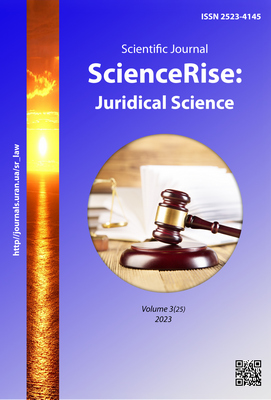Legal custom and other rules established by practice: issues of correlation
DOI:
https://doi.org/10.15587/2523-4153.2023.285398Keywords:
customary law, legal precedent, practice of state authorities, personal business practiceAbstract
The article is devoted to the issues of the comparison between legal custom and other rules, formed by practice. In particular, the correlation of legal custom with the practice of state authorities, legal precedent and personal business practice is considered. Identifying the relationships between them makes it possible to understand the meaning of the corresponding phenomena. Differences in the legal nature of the mentioned phenomena cause the fact that some are sources of law, while others are not. The acquisition or loss of certain parameters (features) can lead to the transition (transformation) of one phenomenon into another with corresponding consequences.
It is explained, that the practice of state authorities is not an independent form of law, but can create such forms - legal custom, legal precedent, etc. It can also create quasi-legal phenomena – agreements between governing subjects, clerk habits, etc. The criteria for distinguishing between legal custom and legal precedent are defined: subjects, the nature of law-making practice, the intensity of such practice, the justification of validity and content, the level of certainty and formalization, as well as the scope of legal action. A legal custom is a general social practice, which consists in repeating certain actions several times or refraining from them by a wide range of subjects. Instead, legal precedent is formed by the special practice of the competent authority in the course of law enforcement, which is most often expressed in a specific judicial or administrative decision.
It has been found, that business practice is able to create two basic types of rules for contracting parties – legal customs and rules of personal business practice. The first of them are characterized by generality and in terms of legal consequences are equated to the norms, contained in the legislation. Instead, the latter bind only specific counterparties, and therefore are equivalent to the terms of the contract, concluded between them. The use of the term "custom" to delineate the rules, formed by personal business practice, is not only contrary to its nature, but also creates a terminological imbalance in law of obligations
References
- Bedrii, M. (2018). Main and additional features of the legal custom in the context of the search for its definition. ScienceRise: Juridical Science, 1 (3), 25–33. https://doi.org/10.15587/2523-4153.2018.127214
- Magaziner, Ia. M. (2006). Izbrannye trudy po obshchei teorii prava. Saint-Peterburg: Iuridicheskii tcentr Press, 352.
- Shemshuchenko, Yu. S., Yushchyk, O. I. (2010). Dzherela konstytutsiinoho prava Ukrainy. Kyiv: Naukova dumka, 712.
- Sav’iak, O. V. (2008). Pravovyi zvychai u systemi dzherel konstytutsiinoho prava Ukrainy. Kyiv, 219.
- Studnicki, F. (1949). Działanie zwyczaju handlowego w zakresie zobowiązań z umowy. Prace komisji prawniczej. Nr. 4. Kraków: Drukarnia Uniwersytetu Jagiellońskiego, 153.
- Zherebtcov, A. N., Chaban, E. A. (2013). Administrativnoe obyknovenie i ego znachenie dlia pravoprimenitelnoi praktiki. Obshchestvo i pravo, 3 (45), 225–230.
- Bedrii, M. M., Syrko, M. V.; Kiselychnyk, V. P. (Ed.) (2018). Teoretychni osnovy administratyvnoho prava. Lviv: Spolom, 120.
- Marchenko, M. N. (2007). Problemy obshchei teorii gosudarstva i prava. Vol. 2. Pravo. Moscow: Prospekt, 760.
- Wróblewski, J. (1989). Zasady tworzenia prawa. Warszawa: PWN, 179.
- Bedrіi, M. (2020). Pravovii zvichai і pravovii pretcedent: okremі aspekti spіvvіdnoshennia. Problemi derzhavotvorennia і zakhistu prav liudini v Ukrainі. Ch. 1. Lvіv, 75–79.
- Tsyvilnyi kodeks Ukrainy vid 16.01.2003 No. 435-IV (2003). Vidomosti Verkhovnoi Rady Ukrainy, 40-44, St. 356.
- Chubatyi, M. (1947). Ohliad istorii ukrainskoho prava. Istoriia dzherel ta derzhavnoho prava (Zapysky za vykladamy na Tainim Ukrainskim universyteti u Lvovi rr. 1920-1923). Ch. I. Miunkhen: UVU, 88.
- Preisner, A., Trzciǹski, J. (1997). Zwyczaj i prawo zwyczajowe. Charakter i strukura norm Konstytucji. Warszawa: Wydawnictwo Sejmowe, 185–195.
- Safjan, M.; Safjan, M. (Ed.) (2007). Zwyczaj jako źródło prawa prywatnego. System prawa prywatnego. Vol. 1. Prawo cywilne część ogólna. Warszawa: CH Beck, 215–236.
- Kelzen, H. (2004). Chyste pravoznavoznavstvo. Kyiv: Yunivers, 496.
- Dobrov, O. (1928). Pravoutvorennia bez zakonodavtsia (narysy z teorii dzherel prava). Chastyna persha. Zvychaieve pravo. Pratsi komisii dlia vyuchuvannia zvychaievoho prava Ukrainy. Kyiv: VUAN, 2, 295–415.
- Pecyna, M. (2009). Naruszenie zobowiązania w świetle harmonizacji prawa zobowiązań. Studium prawnoporównawcze. Warszawa: Wolters Kluwer Polska, 469.
- Koźmiǹski, L. (1948). Zwyczje handlowe. Kupno-sprzedaż. Warszawa: Trzaska, Evert i Michalski, 172.
- Regelsberger, F. (1893). Pandekten. Leipzig, 717.
Downloads
Published
How to Cite
Issue
Section
License
Copyright (c) 2023 Marian Bedrii

This work is licensed under a Creative Commons Attribution 4.0 International License.
Our journal abides by the Creative Commons CC BY copyright rights and permissions for open access journals.
Authors, who are published in this journal, agree to the following conditions:
1. The authors reserve the right to authorship of the work and pass the first publication right of this work to the journal under the terms of a Creative Commons CC BY, which allows others to freely distribute the published research with the obligatory reference to the authors of the original work and the first publication of the work in this journal.
2. The authors have the right to conclude separate supplement agreements that relate to non-exclusive work distribution in the form in which it has been published by the journal (for example, to upload the work to the online storage of the journal or publish it as part of a monograph), provided that the reference to the first publication of the work in this journal is included.








